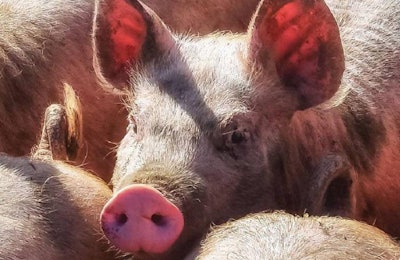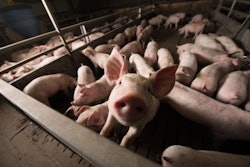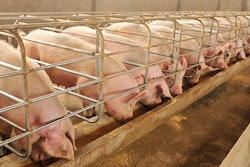
Over the past 2 weeks, new outbreaks of African swine fever have been reported in Poland, Romania, Russia, Slovakia and Ukraine.
So far this year, 1,794 outbreaks of African swine fever (ASF) have been confirmed among domestic pigs, according to the latest update of the Animal Disease Information Notification System from the European Commission (EC; as of December 5). ASF cases have been recorded in 10 countries in 2021.
For comparison, 1,240 ASF outbreaks in 10 states in the region were registered with the EC System during the whole of 2020.
Of the states registering cases through this system this year, four have reported new outbreaks since the previous update (on November 21). These include the worst-affected country, Romania (now with 1,604 outbreaks so far this year).
Also notifying the EC of new cases of the disease this month have been Poland, Slovakia and Ukraine. Their outbreak totals stand at 122, 10 and 11, respectively, for the year so far.
Poland’s latest outbreak was in a herd of 64 fattening pigs in the province of Holy Cross. This was confirmed by the national chief veterinary office on November 26.
All of the 27 recent outbreaks officially registered by the Romanian veterinary authority were in backyard herds. According to the latest reports to the World Organisation for Animal Health (OIE), these involved a total of 323 pigs across the country. Majority of these cases were in central and southern counties.
ASF returns in swine to 2 regions in Russia, Ukraine
Over the past two weeks, ASF virus has been detected again in the Penza and Saratov regions of Russia.
Located in the Volga federal district, Penza has been free of ASF for just three weeks, according to the official report from the Russian authorities to the OIE. However, the virus was detected on two backyard herds in the Kuznetsky district in mid-November. Affected were 15 pigs.
By the end of November, cases were detected in the neighboring region of Saratov. Again, a small backyard herd tested positive for the virus. Saratov had been free of ASF for less than two months.
According to official reports from Ukraine’s animal health agency, ASF virus has been detected in the Kirovohrad region. Affected was a premises described as a “farm” with 29 pigs after a 10-month absence from this centrally located region.
In the south of the country, the disease was confirmed in a group of four pigs earlier this month. The herd was in the Kherson region, where ASF was last detected in mid-September.
Russia declares ASF resolved in 5 regions
In each case after a period with no new cases detected in domestic pigs, the Russian authorities have declared to the OIE that the ASF situation has been resolved in five regions.
Three are in the Central federal district — Tver, Ivanov and Vladimir. The declaration also covers the Mari El Republic (Volga federal district) and Pskov (Northwestern district).
Over two months this year, a total of 11 outbreaks were confirmed in the Pskov region. Of these, six were in domestic pigs, including at two premises described as “farms.” One had around 3,500 animals, and the other had more than 53,000. Also testing positive for the ASF virus in this region were 10 wild boar. The most recent cases, however, were in early September.
Meanwhile, three ASF outbreaks were recorded in domestic pigs in the Mari El Republic during mid-October, two in Vladimir up to early September, and one each in Tver (in mid-July) and Ivanov (in early October).
New cases in wild boar reported in 10 European countries
Through its notification system, EC had been informed of a total of 11,192 outbreaks of ASF among wild boar in 2021 (to December 5). This is an increase of 578 from the previous update to November 21.
Recording the most outbreaks in Europe so far this year is Poland with a total of 2,791 — 173 more than before. Hungary’s total stands at 2,547 outbreaks. Registering the largest increase over the period was Germany, which has confirmed 2,340 outbreaks in wild animals since the start of 2021.
Also reporting new cases to the EC over the previous month were Slovakia (1,587 outbreaks so far this year), Romania (961), Latvia (306), Bulgaria (298), Lithuania (213), Estonia (64) and Italy (11).
For comparison, total outbreaks across the region reported to the EC during the whole of 2020 was just over 11,000 outbreaks in 14 countries.
ASF cases in German wild boar approach 3,000
Across Germany, the number of wild boar that have tested positive for the ASF virus has risen to 2,941. This figure includes all cases in the wild population since the first case in September of 2020. The total comprises 2,223 in the eastern state of Brandenburg, 711 in neighboring Saxony, and seven in Mecklenburg-West Pomerania.
Virus-positive wild animals have been found in seven districts in Brandenburg, and two in each of the other two states.
According to Germany’s national veterinary agency, the Friedrich-Loeffler Institute, the ASF virus was detected in a wild boar in a third district of Saxony — Bautzen — this month.
Evolving ASF situation in Russia’s wild boar
The EC does not monitor the animal disease situation in Russia. However, the national veterinary authority has registered with the OIE two new cases of ASF in wild boar. One was detected in each of the Penza region (in the Volga federal district), and Yaroslavl (Central federal district).
According to OIE reports, the ASF situation in the Novgorod region has been “resolved.” This came after two virus-positive cases in October, based on OIE reports, which had followed six more cases earlier in the year. Novgorod is located in Russia’s Northwestern federal district.
Call for ban on pork imports to the United Kingdom
No cases of ASF have occurred in the United Kingdom (U.K.) — in domestic pigs or in wild boar.
With the aim to maintain the country’s disease-free status, the National Farmers’ Union of Scotland has called on the U.K. government to halt imports of pig products from EU countries with confirmed ASF cases.
Latest updated from the U.K. government department Defra continues to assess the risk level of ASF entering the country at medium. This represents the risk of personal imports of pork products from Romania over the Christmas period carrying the ASF virus. Although the U.K. has now left the EU, there has been no change to the rules for passengers travelling into Great Britain from the EU with products of an animal origin from January 2021. However, all travelers are strongly advised to avoid bringing pork products into the country. This advice covers dried and cured meats, sausages, salamis and pâté, as well as fresh pork from affected parts of Europe.
Recently announcing measures to protect its national pork industry from ASF has been Canada.
View our continuing coverage of the global African swine fever situation.

















